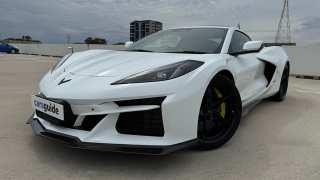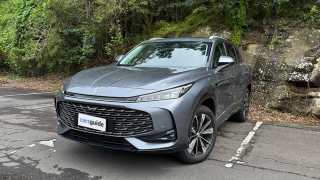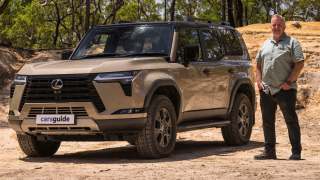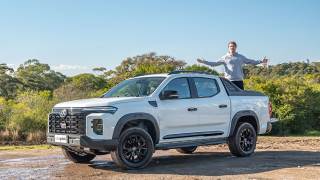Mini delves into the details of the upcoming second-generation Countryman SUV ahead of its public premiere at the Los Angeles motor show. Australian arrival pegged for first half of 2017.
It may have been one of the most divisive models in the brand's 57-year history, but the Countryman SUV has earned its place in Mini's model line-up. Considering that desirable but underperforming models such as the Coupe, Roadster, and Paceman are reportedly facing the axe, Mini has committed themselves to the Countryman by rolling out the second-generation model.
With Mini repositioning themselves in the ‘premium compact segment' and aiming for a more mature audience, the new Countryman's appearance reflects the brand's changing appeal.
Continuing Mini's design evolution that is rooted heavily in tradition, the new Countryman doesn't stray too far from its predecessor in its overall proportions. Though the new Countryman bears plenty of its predecessor's key design cues such as the ‘helmet roof', squarish headlights, and its unmistakable hexagonal front grille, its lines are sharper and its taut surfaces are better defined.
Several details on the body has been refined, such as the metal edging that draws a distinctive black band around the car and connects the wheel arches, is said to be made squarer in its appearance, whereas its side turn indicators housed on its side scuttles are now arrow-shaped. Aligning the new Countryman with the rest of the current Mini range are styling such as the LED DRL rings around the headlights, and the enlarged rear lights with the circular lighting elements.
The biggest exterior change, however is size. Measuring 4,299mm long and 1,822mm wide, the Countryman has grown by 202mm and 33mm respectively. The Countryman's wheelbase has also expanded by 75mm to 2,670mm, and at 1,557mm tall it is only marginally higher than before. By comparison, the new Countryman is only 140mm shorter than the current X1, but just as wide.
All that growth is said to translate into a larger cabin space, with the cabin offering five fully fledged seats, and up to 13cm longitudinal adjustment for the rear seats. Mini says that there is more head and shoulder space up front, while the rear door openings have been enlarged and, more importantly, it has more legroom to offer.
The Countryman's interior has a more premium appearance.
Round the back the new model now offers 450 litres of boot space, which can be expanded to 1,309 litres with the 40:20:40 split folding rear seats folded down, a maximum increase of 220 litres over its predecessor.
Of course a Mini wouldn't be complete without a few unconventional fixtures. Instead of a stainless steel insert on the loading sill of the rear boot, the Countryman can now be specified with a flexible ‘Picnic Bench' that can be folded out to provide seating for two.
As demonstrated with the Clubman - the first model under Mini's brand realignment - the Countryman's interior has a more premium appearance.
Mirroring the Clubman's dashboard layout closely, the Countryman's is wider and features an electric parking brake switch located on the centre console, allowing room to squeeze in additional storage compartments in front of the gear lever. Like the Clubman, the Countryman can be specified with diagonal stitched seating upholstery and the Mini Yours option that features illuminated patterns that are projected from translucent strips which are integrated into the trim.
New to the Mini brand is an optional 8.8-inch touchscreen that is integrated into the centre instrument panel that is encircled by Mini signature LED ring, a feature that is just only getting introduced into BMW model range with the 7-Series and now the new 5-Series. The touchscreen multimedia system can also be controlled via the Touch Controller dial, and is part of the optional Wired package which includes the Mini navigation system Professional.
Another development that is unique to the Countryman is the optional Mini Country Timer feature that registers the vehicle's movement over slopes, ditches, or slippery surfaces from the control unit of the stability control feature. The information is then gathered to display playful graphics that describes the vehicle's status in relation to the driver's driving.
Mini has confirmed that it will be introduced here in the first half of next year.
As for powertrain options, the Countryman will come with five engine options internationally, comprising of two petrol and two diesel engines it shares with the standard hatch range, and the brand's first plug-in hybrid model, the Cooper S E Countryman ALL4.
For standard petrol engines, the Countryman range starts off with the Cooper variant, with its 100kW/220Nm 1.5-litre turbocharged three-cylinder unit, followed by the Cooper S with a 141kW/280Nm 2-litre turbocharged four-cylinder mill.
In regards to diesel powertrains, both the Cooper D and Cooper SD features a 2-litre turbocharged four-cylinder engine with power outputs of 110kW/330Nm and 140kW/400Nm respectively.
While the Cooper comes with a choice of a six-speed manual or automatic, the Cooper S and Cooper D can be specified with an eight-speed automatic, though that transmission comes as a standard fitment on the Cooper SD.
That being said the Cooper, Cooper S, Cooper D, and Cooper SD are available with an all-new ALL4 all-wheel drive, as an option. The new ALL4 system is said to deliver quicker reaction times thanks to the integration of a power take-off unit in the front differential and the Dynamic Stability Control unit, whilst being more compact and offers better efficiency.
Although the Cooper S E plug-in hybrid variant wears the ALL4 designation, it doesn't have an actual ALL4 all-wheel drive mechanicals beneath. Instead it's all-wheel drive capability is similar in principle to that of the i8 with a 65kW electric motor powering the rear wheels and the 100kW 3-cylinder petrol sending power to the front via a six-speed automatic, giving a total system output of 165kW and 385Nm of torque. According to Mini the electric motor is able to haul the Countryman up to a speed of 125km/h, though no details have been released on its all-electric range.
For now exact details on Countryman models bound for Australia are yet to be finalised, though Mini has confirmed that it will be introduced here in the first half of next year. While BMW Australia can neither confirm nor deny if the Cooper S E variant will be amongst the new Countryman's line-up here, Lenore Fletcher, BMW Australia's general manager of corporate communications says that they are keen on introducing it here to complement the group's extensive range of plug-in hybrid and all-electric models.
Is Mini on the right track this time around? Tell us what you think in the comments below.



















Comments